Winn-Dixie Reverses Itself in the Mask Wars, Revealing Cultural and Political Divides
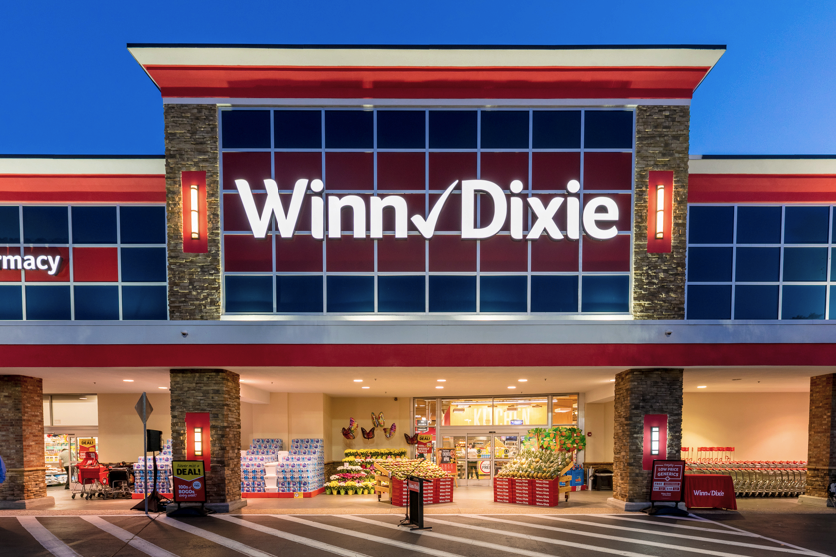
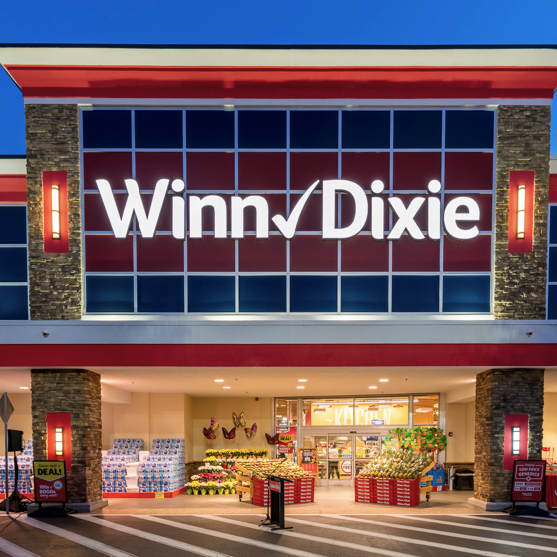
A Winn-Dixie storefront in South Carolina.
Of all the public health measures enacted to reduce the spread of coronavirus, in the U.S. at least, the wearing of masks has proven to be the most politically and culturally explosive. One recent example was the sudden reversal of Deep South supermarket chain Winn-Dixie earlier this week from a no-mask stance, stating it was a “highly charged issue with our customers,” to joining other supermarket chains like Walmart and Costco in requiring face masks.
Face masks meet a dog whistle at Winn-Dixie
As food reporter Laura Reiley of the Washington Post noted, the about-face came hours after President Donald Trump tweeted a picture of himself with a mask and called mask-wearing patriotic. Phil Lempert, editor of SupermarketGuru.com, told the Post that the earlier no-mask policy at Winn-Dixie was a dog whistle of sorts, meant to align the company with the values and political stance of its customers.
Winn-Dixie’s see-sawing on masks is representative of America’s cultural war over masks, where anti-mask protests have erupted from California to Texas to New Jersey and elsewhere across the country, asserting that any such mandate infringes on citizens’ personal freedom. At times the anti-mask fervor has become violent, with employees who tried to impose the mask requirement being attacked by irate customers, even fatally, as at a Michigan Family Dollar store.
Trump’s recent tweet of himself wearing a mask, after long downplaying the importance of mask-wearing in the fight against the pandemic, may signal a lessening of these tensions. The U.S. Surgeon-General Jerome Adams this week told the conservative audience at Fox and Friends, “I’m pleading with your viewers. I’m begging you. Please understand that we are not trying to take away your freedoms when we say, ‘Wear a mask,’” CNN reported. Dr. Anthony Fauci, the country’s top infectious disease expert, applauded the president’s support of masks on NPR’s Morning Edition yesterday, stating, “I think we’ve turned the corner on the road of a consistent message.”
Yes, masks work, so more businesses are requiring them
The latest scientific data bears out the effectiveness of masks in curbing the spread of the coronavirus. Earlier this month, the Institute for Health Metrics and Evaluation (IHME) at the University of Washington forecast 45,000 fewer deaths from the coronavirus in the U.S. by Nov. 1 if at least 95 percent of people wear masks in public. Scientists from IHME told NPR that the latest analysis shows that wearing cloth masks could reduce transmission by 30 percent.
While a federal mask mandate seems unlikely given the current position of the White House, many states; businesses like retailers Home Depot, Lowe’s, and Gap; airlines; and, recently, the Marriott Hotels have not hesitated to enact their own mask requirements. While Marriott required employees to wear masks for several months, now guests must wear masks in lobbies and public spaces as well.
Masks are presenting challenges worldwide
The anti-mask sentiment might be red-hot in the U.S., as seen with Winn-Dixie, but it’s also being felt elsewhere in the world. In the United Kingdom, Brits remain reluctant to wear face masks, despite having the highest coronavirus death toll in Europe. And France, which this week made masks mandatory in all enclosed public spaces amid fresh outbreaks, has experienced its own backlash against masks, with a group of passengers beating to death a French bus driver who asked them to wear masks.
The sentiment against masks is not without historical precedent. The Anti-Mask League of 1919 was formed in San Francisco following the outbreak of the 1918 Spanish flu pandemic, and hundreds of “mask slackers” were arrested after failing to comply with the law. Echoing some of the sentiments heard today, the League members believed the masks were unsanitary, useless and a threat to their constitutional rights, Business Insider reported.
Those 1919 anti-maskers eventually won a repeal of the mask-wearing mandate, but San Francisco became one of the worst-hit cities in the U.S., with 45,000 residents infected and more than 3,000 deaths. The hope among infectious disease specialists and other proponents of mask wearing as an important tool in the fight against coronavirus is that, this time, history won’t repeat itself.
Sign up for the weekly Brands Taking Stands newsletter, which arrives in your inbox every Wednesday.
Image credit: Ryan Ketterman/Wiki Commons
Why Corporate America’s Diversity Hiring Promises Ring Hollow
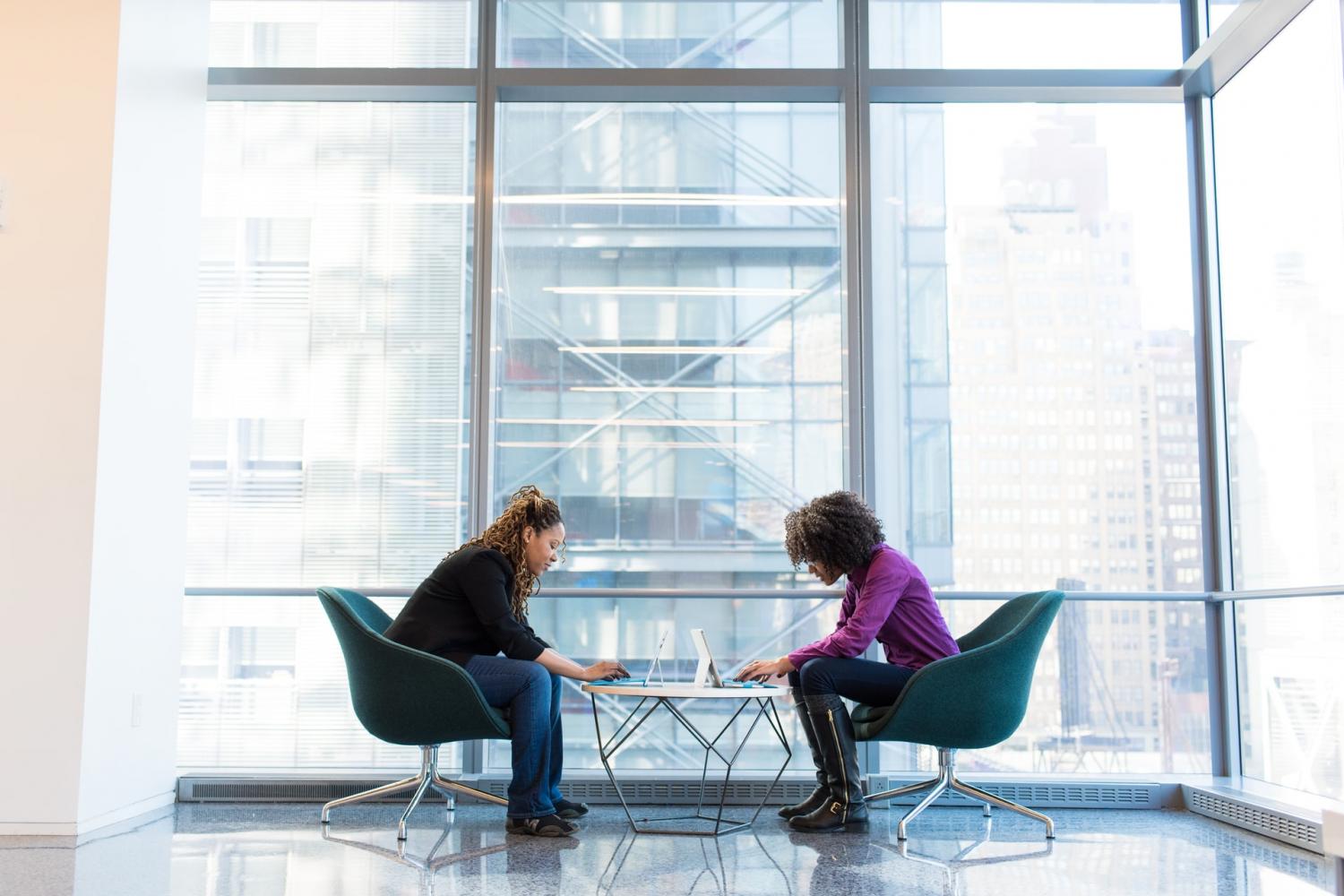
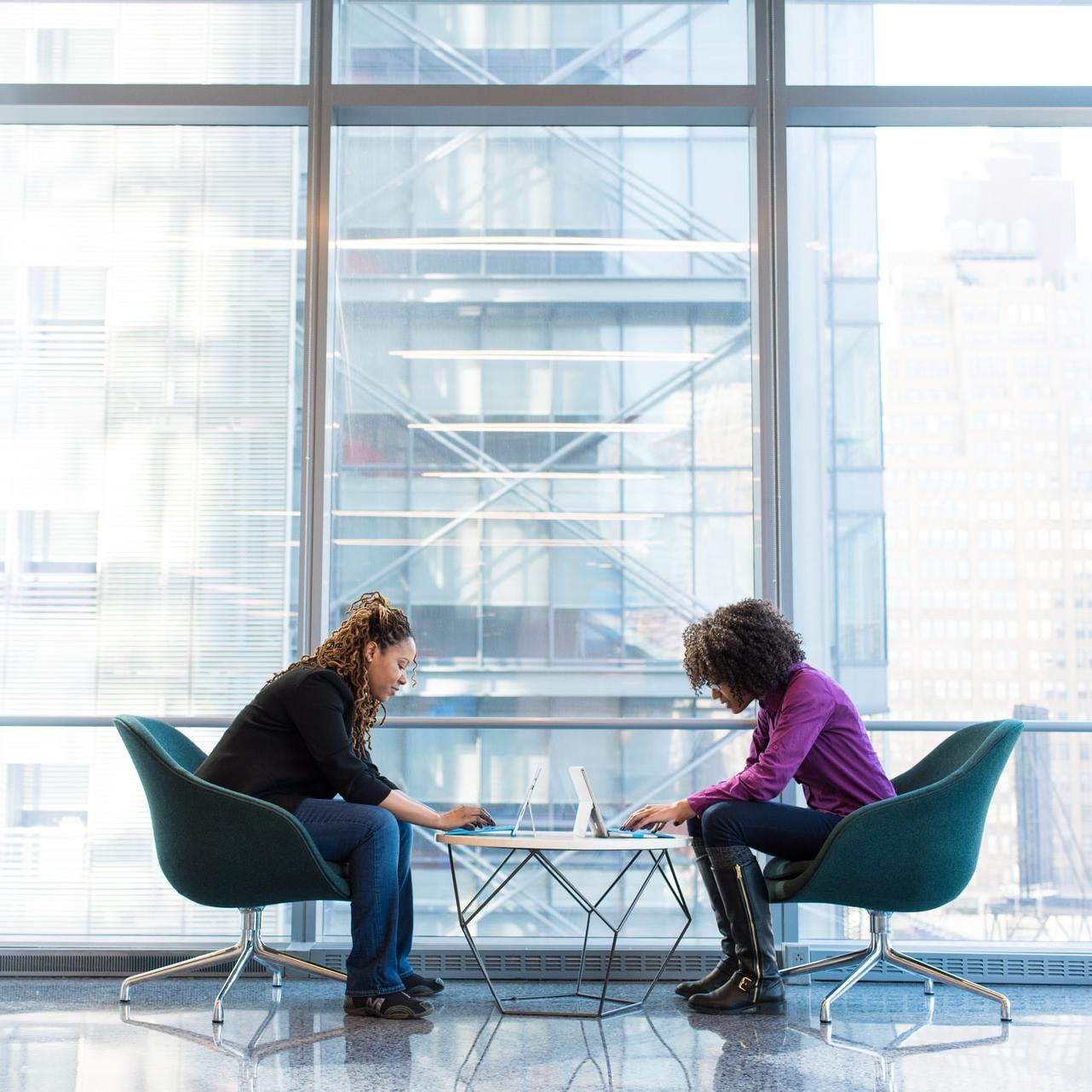
With Jide Zeitlin’s resignation from Tapestry this week, the Fortune 500 now includes three companies headed by Black CEOs, all of them men. Only two Black women have ever headed an S&P 500 company – Ursula Burns of Xerox, along with Mary Winston, who served as CEO of Bed Bath and Beyond on an interim basis for six months last year.
The long path toward racial equality is not only occurring in our neighborhoods and cities – it’s also unfolding within both corporate America’s C-suites and the investor community.
Try calling it a concrete ceiling
Black women in particular face this paradox: Despite being the most educated segment of the U.S. population, and largely driving the development of new companies across the U.S. for the past several years, they often struggle to get the funding they seek to scale up their businesses.
In the wake of the nationwide protests after the murder of Black Americans by police officers, companies in all sectors have been stepping over themselves to promise a more inclusive workplace and, more significantly, more diverse corner offices.
The promises have been fairly boilerplate: a boost in diversity hiring and advancement to the C-suite, with the goal to be achieved by 2025. But such pledges have raised more than a few eyebrows, especially considering that the U.S. is still in the midst of a pandemic and unprecedented unemployment that as of today shows no signs of abating anytime soon.
More than diverse hiring is needed
First of all, a rapid push to have a less white C-suite can run into problems if a company has had a long history of resistance to any shift in culture. “Companies that say they want to diversify will diversify and then be shocked at how the company is being asked to change,” Nicole Sanchez, a managing partner of a consulting firm, told the Washington Post earlier this week.
The bottom line is that if a company is going to chip away at that glass (or cement) ceiling, it must start with its foundation. That means taking on the hard challenges, such as revamping how a company screens, searches, hires and retain employees. An embrace of salary transparency and the hiring of talented diversity managers are also necessary, wrote Ashley Stahl in Forbes.
Black women in particular face even more hurdles than their male counterparts, as they often deal with the double whammy of racial and gender bias. In a recent CNBC profile, Black women asked to discuss their career paths mentioned they often lack access to mentorship, the opportunities to lead on projects, and other forms of support that were readily available to white women.
Money absolutely matters
The lack of opportunities is not just about career advancement – it’s also largely about money, whether it’s being granted the chance to invest it, or even manage it. Despite the vastly documented evidence showing the strong entrepreneurial streak of Black women, a 2018 report showed they received less than $300 million in venture capital or angel funding during a nine-year period ending that year. In other words, less than 0.0006 percent of all startup funding went to companies led by Black women.
Here's one explanation for that miserly percentage: Only about 1 percent of all assets are managed by Black investment managers.
Then add the coronavirus pandemic's effects. Many of these same Black entrepreneurs have reported that the effects of COVID-19 are hitting their businesses hard — as much as 98 percent, as stated in one survey. That statistic alone is a chilling reminder that 2025 is too long to wait for the Americans who have already heard too many promises about a more welcoming business environment.
Sign up for the weekly Brands Taking Stands newsletter, which arrives in your inbox every Wednesday.
Image credit: Unsplash
This Bank Launched a Climate Action Checking Account
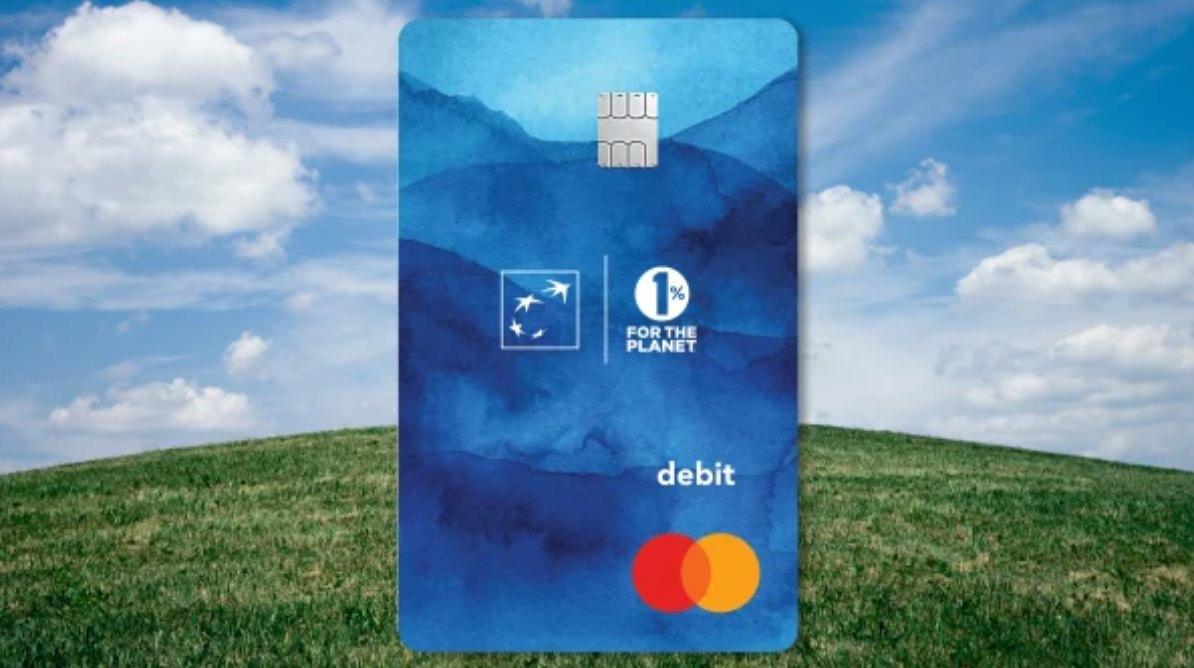

Just about every large bank has announced a climate action strategy in one form or another. Some have responded with a plan to provide financing for low-carbon technologies. Others claim they are integrating climate analysis across their investment portfolios. One problem these banks face, however, is that while they say they are providing capital needed for a low-carbon economy, they also continue to fund carbon-intensive industries.
But another challenge the largest banks currently face is gaining their customers’ buy-in. It’s easy to make the connection between certain kinds of foods and their carbon footprints. Automakers make it easy by praising the virtues of their hybrid and all-electric models. For the financial sector, however, making that connection is a far peskier riddle. Most consumers won’t bother to investigate whether the institutions holding their funds are also providing loans for polluting industries. Making the connection between a bank’s operations and how they can push climate action forward is even more difficult to conceptualize.
But what if you actually engage your customers to do their part to further climate action or, at a minimum, make them aware of how their purchasing decisions have an impact on the planet? California-based Bank of the West says it’s doing just that with its newly launched 1 Percent for the Planet Account. Teaming up with the NGO that goes by the same name, Bank of the West says it’s done what it could with every aspect of this banking product to make it a more sustainable option.
Let’s start with the debit card (as no one writes checks these days, right?), which the bank says is made with a biodegradable and compostable plastic. Customers who have signed up with this account can go online and view the carbon impact of each of their purchases. And 1 percent of the revenues generated from each of these accounts goes to a nonprofit that’s partnering with 1 Percent for the Planet. As of press time, that NGO is Protect Our Winters (POW), a nonprofit founded in 2007 that brings together people passionate about the outdoors to advocate for policies that will allow the world to become carbon neutral by 2050.
There’s an economic sustainability asset too: At a time when many banks are accused of badgering their customers with countless fees, this Bank of the West checking account is free of any monthly charges.
1 Percent for the Planet says its business members have been a part of the organization’s ability to donate more than $265 million to its environmental partners.
Bank of the West is a subsidiary of BNP Paribas, the Paris-based banking giant holding over $2 trillion in assets that has its own sustainability agenda, a climate action plan that includes the funding of billions of dollars in renewable power projects.
Image credit: Bank of the West/Facebook
Uber Gives a Lift to Contact Tracing Efforts
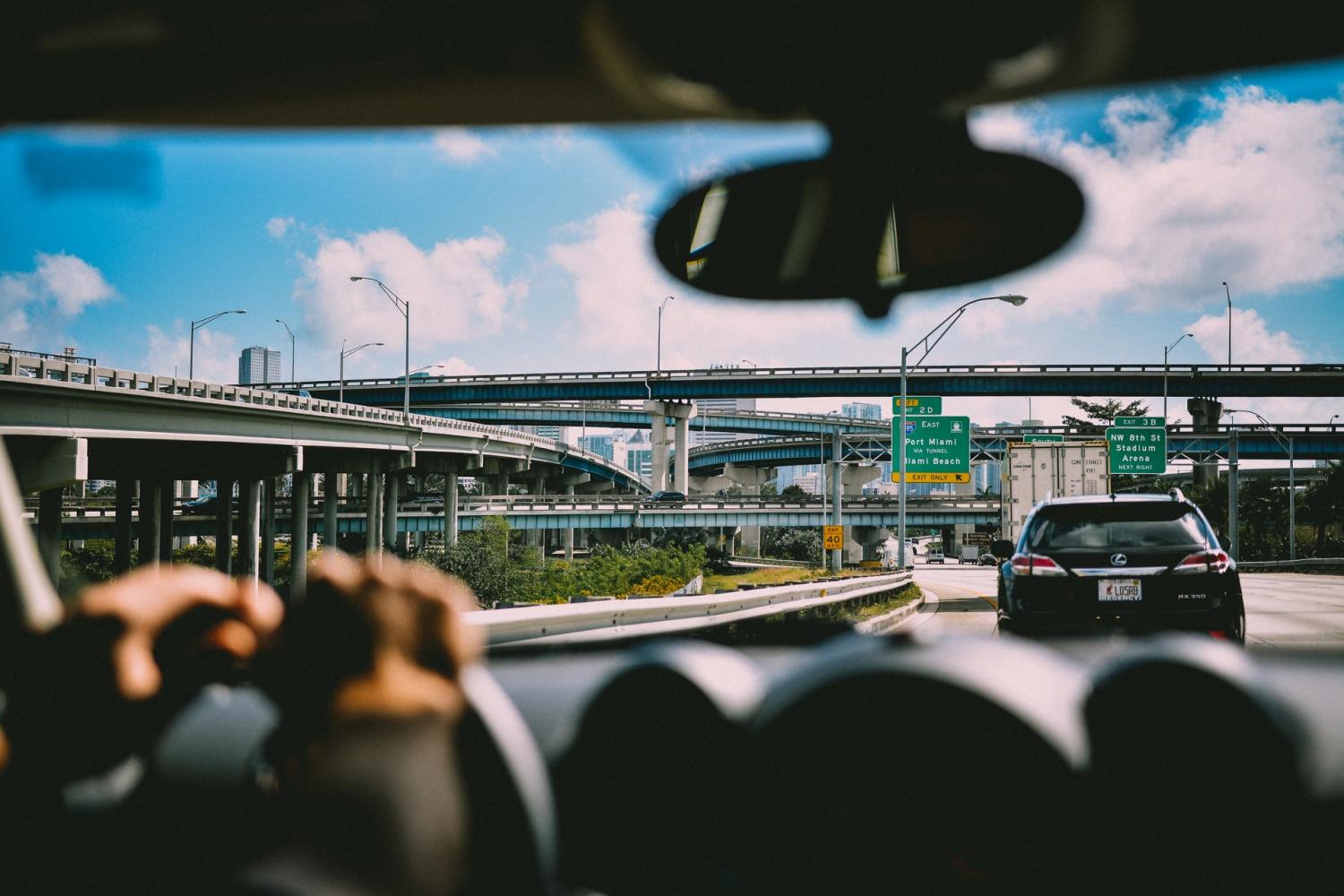
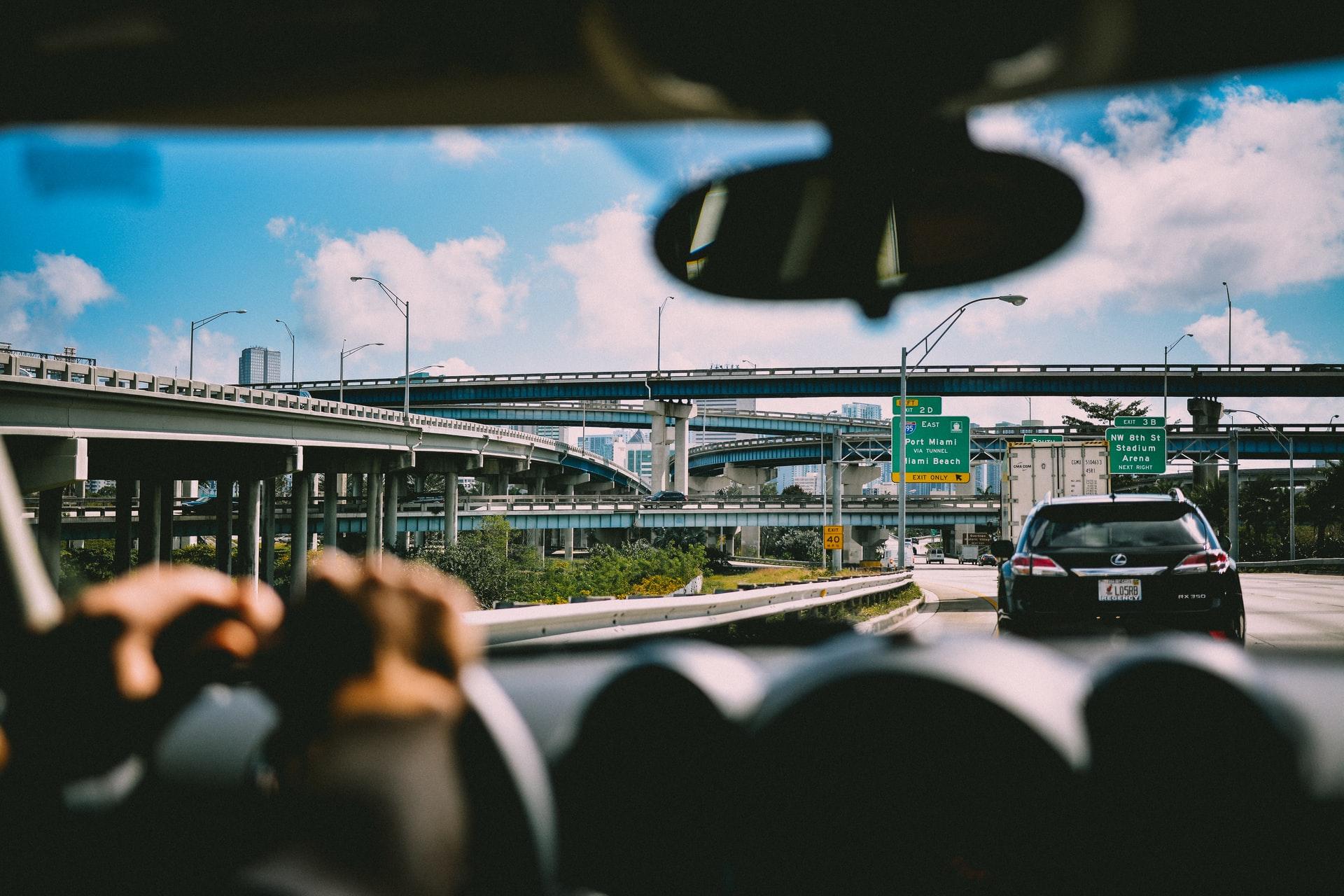
To date, the U.S. still does not have a nationally coordinated contact tracing program that would help manage the spread of the coronavirus. The White House, in fact, has made clear that it would oppose any federal legislation that funds programs for contact tracing and testing.
A ridesharing company with plenty of data
Could the private sector help to drive contact tracing efforts? Pardon the pun, but ridesharing giant Uber says it is doing just that — and already has been doing so on the sly.
Since this spring, Uber has been sharing worldwide data that is related to infectious diseases, including COVID-19, the disease caused by the coronavirus, with public health departments. The way Uber works with public health authorities (PHAs) is that if such an agency requests data to which it is entitled by local law, Uber has a process in place by which it will release information on both Uber drivers and passengers.
A contact tracing plan on the down-low
As Reuters recently reported, Uber executives met with the U.S. Centers for Disease Control and Prevention (CDC) and local public health officials in January, when the disease was first beginning to spread outside of China, to sort out how the ridesharing company could help with data collection efforts.
Uber now manages a portal that so far has filed requests from 40 locations across the United States. Worldwide, the company has fielded 560 requests on those potentially exposed to COVID-19 across 29 nations.
Such information is crucial for contact tracing efforts, as it can help local officials notify people they may have been exposed to the coronavirus in the event someone infected with the virus used or provided Uber’s services. But Uber is also doing its part to stop the spread, as it will block users from using its app for 14 days if they are confirmed to have contracted the virus.
The private sector has an opportunity to step up and stand out
At first gut-check, privacy advocates may object to the sharing of such data, but Uber has made it clear that it will only share its users’ data with government officials if there’s a definite link to public health risks. And in the absence of any guidance from the federal government, state and local public health officials are scrambling to build viable contact tracing systems – and they need as much help as they can get as local budgets have been left in shambles. Scoring such data from the likes of Uber and its competitors can help track those who have been infected with the coronavirus, get them the treatment they need and prevent them from spreading it to others.
Uber would never admit this publicly, but there’s an additional benefit for the company: Becoming a proactive partner in the fight against COVID-19 could help burnish the company’s reputation in the long run. There’s no shortage of stories outlining the company’s struggles on all fronts, from its shortcomings on diversity in the workplace to its efforts to thwart local governments from regulating its services. At a time when investing tied to environmental, social and governance (ESG) factors shows no signs of going away any time soon, some investors in this space have been skittish about including Uber within their portfolios.
At a time when the U.S. has steepened the curve instead of flattening it, Uber’s action now could become a future case study of how a company can respond to a crisis with the tools it already has at hand.
Image credit: Andras Vas/Unsplash
Across the Pond, the London Stock Exchange’s Green Economy Mark Gains Traction
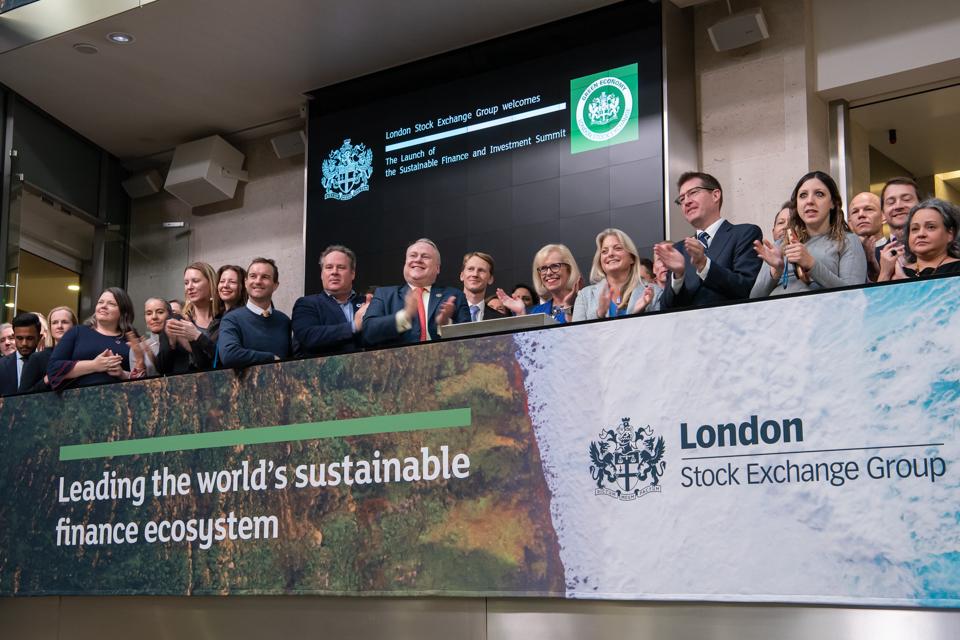
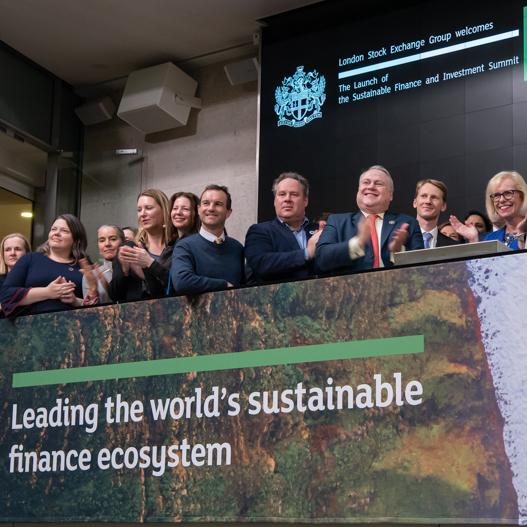
The London Stock Group (LSEG) published its 2020 green economy report last week and unveiled a number of new issuers receiving the bourse’s Green Economy Mark. This LSEG certification process, which recognizes sustainable businesses across eight industry pillars, acknowledges securities issuers that derive more than 50 percent of their revenues from sustainable products and services. The total value of companies that have received this certification from LSEG stood at over $83 billion (or 67 billion British pounds) by the end of June 2020.
A certification investors can readily understand
Eight new issuers have now received the LSEG’s certification, which is based on a data model developed by the index provider FTSE Russell. The total number of issuers that are licensed to use this certification is now at 86, up 16 percent since the Mark’s launch last October. There are 46 issuers to be found on the exchange’s Main Market, with another 40 on the LSEG’s Alternative Investment Market (AIM).
Furthermore, the LSEG’s report underlines its stated commitment to support sustainable finance and investment. And it has been shown to make financial sense when investing in companies that are taking sustainability issues seriously. Indeed, investment in these stocks can provide investors with a broad, cross-sectoral and international exposure — rather than a much narrower focus on, for instance, renewable energy infrastructure and “pure-play” clean technology companies.
As such, the Green Economy Mark offers a solution to the challenge of identifying investments within the equities of companies that are focused on a more sustainable economy, according to the LSEG. Though not tracked by an index yet, over the last 24 months, companies assigned the LSEG’s Mark outperformed the FTSE All-Share index — comprising 615 companies in the blue-chip FTSE 100 index, FTSE 250 and FTSE Small Cap — by 36 percent.
Companies certified with the Green Economy Mark demonstrate resilience
While the markets have experienced significant volatility during the COVID-19 pandemic, equities with the Green Economy Mark certification have, in aggregate, demonstrated greater resilience and subsequently recovered faster than the rest of the market. The Mark also “helps navigate and make use of the current green finance tools and stimulate new ideas,” according to the exchange.
Between the launch of the Mark in October 2019 and the publication of this latest report, Calisen Plc, a company based in Manchester that procures, owns, installs, and manages electricity and gas meters for energy retailers, floated in February 2020 on the exchange, raising $418 million. In doing so, it became the first company issuing an initial public offering (IPO) to earn this LSEG certification.
Highlighted as a case study in the report, Calisen was the top Green Economy Mark issuer in terms of capital-raising activity this year, ahead of National Express in second place with $291 million.
At the time of the Green Economy Mark’s launch last year, a total of 74 London equity issuers qualified and were equivalent to an aggregate market capitalization of over $70 billion. At that time, 38 of them represented Main Market issuers with a total market cap of $65 billion and 36 alternative market issuers with a total market cap of $4.6 billion.
Denzil Jenkins, the interim CEO of LSEG, commenting in the wake of the new report, said: “The Green Economy Mark underlines our commitment to finding innovative solutions to support the growing investor demand for actionable climate related financial information. As a leader in green finance, LSEG is ideally placed to support issuers and investors in the transition to a sustainable, low-carbon economy.”
Sustainable investing is here to stay
That said, today the sustainable business economy represents around 6 percent of the market capitalization of global listed companies, equating to approximately $4 trillion. Globally, over $30 trillion in assets under management (AUM) are now linked to sustainable investment strategies, according to the 2018 Global Sustainable Investment Review survey.
LSEG’s analysis reflects what is occurring on the other side of the pond: Sustainable investing is here to stay despite the global COVID-19 pandemic, and now institutional investors are starting to give notice to companies that they expect more disclosures related to environmental, social and governance (ESG) impacts.
The 33-page report accompanies news of other issuers to the Mark. Five of them are from the LSEG’s Main Market (Cairn Homes, National Express Group, SIG, SQN Asset Finance Income Fund, and TI Fluid Systems) and three from alternative market (Gresham House, TP Group, Water Intelligence), joining other Green Economy Mark issuers in highlighting how they are supporting transition to low-carbon economy.
Among the report’s key findings is that while Green Economy Mark issuers represent 8 percent of total capital raised on London equity markets over the past 24 months, this figure is four times their market cap representation, which stands at 2 percent. And so far in 2020, a group of 18 issuers among the segment’s ranks have raised about $1.24 billion in follow-on capital to support balance sheets, growth and fund innovation.
Overall, industrials represent the largest sector of the green economy both by number of issuers (24) and market capitalization ($31.6 billion) on the LSEG, followed by financial companies in the second spot with 23 companies with a market cap of $12.5 billion.
In addition to what is now a total of 86 companies with the Green Economy Mark, an additional 110 issuers on London’s equity markets are reported by FTSE Russell to be generating some level of green revenues below the 50 percent threshold for the mark, most being within the industrial sector.
Image credit: LSEG Media Center
New England is Emerging as a Testing Ground for Agrivoltaics
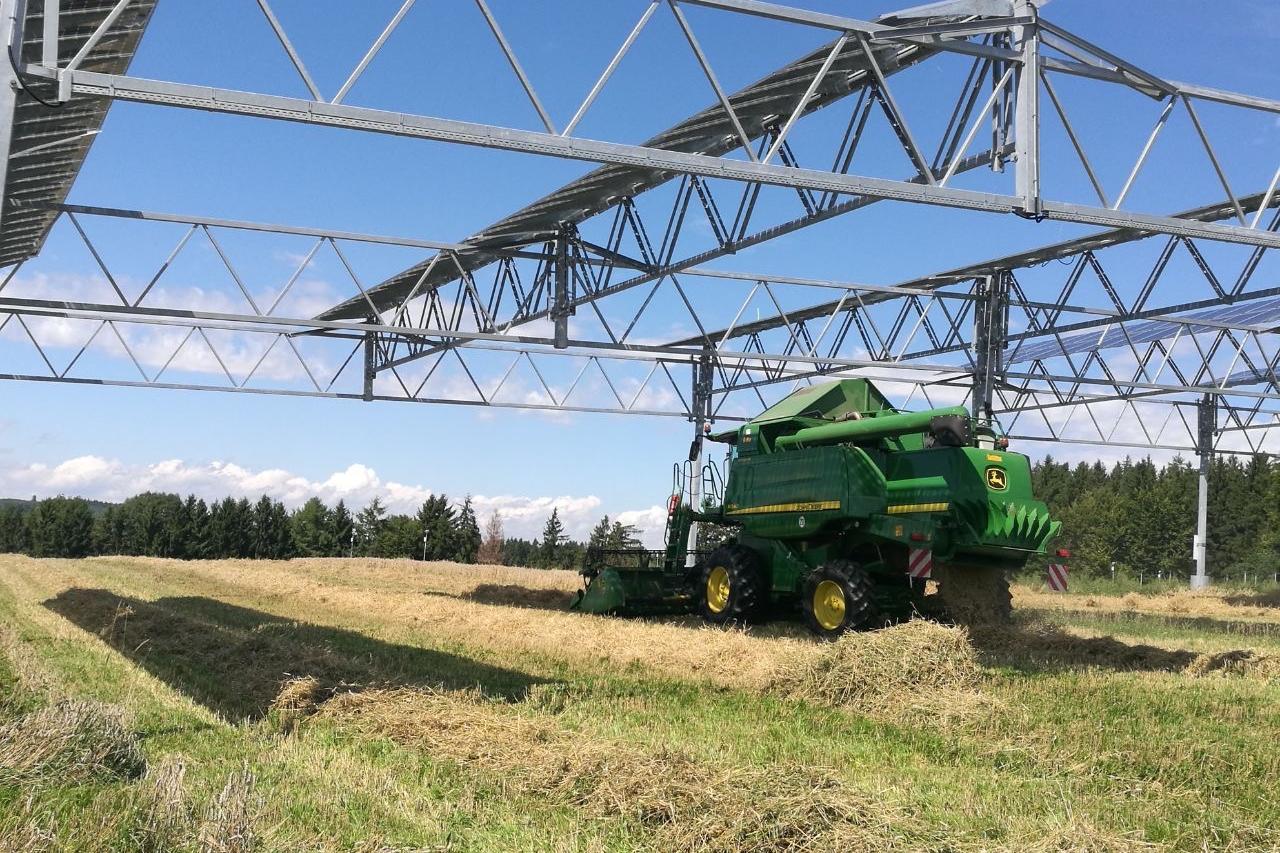
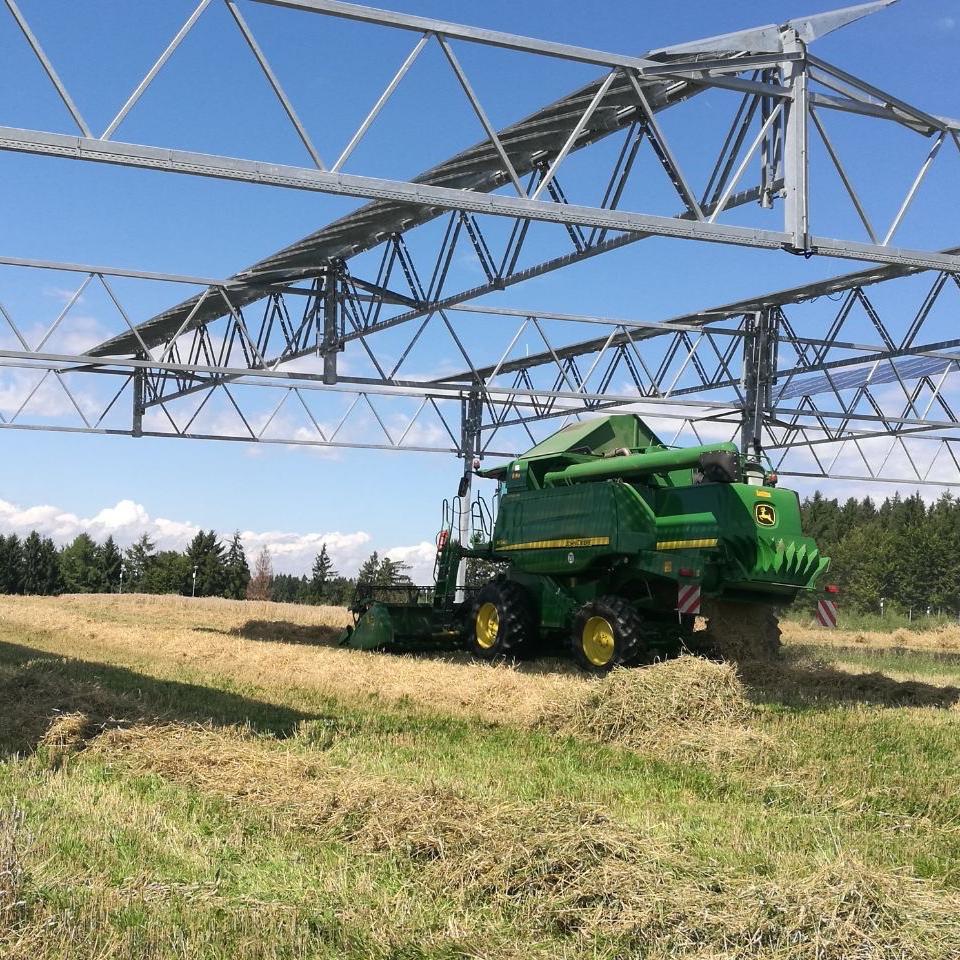
Since quarantine began, many of us are much more aware of the need for producers and companies to maintain a healthy food supply chain. But we still don’t think of what that entails, including the need for agricultural enterprises to ensure lower costs and more viable business models. One opportunity some farmers are trying out is by creating dual-use farms: farms that produce both crops and electricity through solar power, or “agrivoltaics.”
Agrivoltaics (also known as agrophotovoltaics) was a term to reflect new research into how to maximize land use efficiency while generating power for farms, and potentially as an additional revenue stream. For example, some companies are starting to think about dual-use farms as an opportunity for community solar.
Community solar is a business model that allows several consumers to have access to a solar system, spreading the costs and benefits among users. It has been growing in popularity especially in urban areas to help streamline costs, enabling lower-income consumers to participate.
Enter BlueWave Solar and its approach to agriculture and electricity
BlueWave Solar, a company based in Massachusetts, has been working to center dual-use farms in its community solar initiatives. They have designed an approach to allow agriculture to coincide with the solar arrays, spacing and orienting the arrays to allow for more sunlight for the crops and more space for free maneuvering of both equipment and people.
Drew Pierson, Head of Sustainability for BlueWave, said the company has been working with other solar developers in the area as well the agriculture and energy departments of the state of Massachusetts, the University of Massachusetts Clean Energy Extension and the American Farmland Trust to bring the science of solar to improve the efficacy of regional farmland. They want to make the Northeast “a laboratory to make optimal use of our land and develop innovation solutions for food, water, energy, and economics.”
This matters in a region like New England, where about 90 percent of its food has to be imported from outside the region and thus is vulnerable to disruptions in the food supply chain. In order to address resilience issues, the community of researchers, academics, the ag community, and political leadership want to see more food produced within the region, with sustainability and resilience top of mind. But land is constrained and the solutions require innovative thinking.
Thinking local while scaling up agrivoltaics
BlueWave wants to use the Northeast as a test bed for research to develop dual-use technologies that can create a roadmap for scalability across the region and beyond. One key component is water conservation related to solar, an issue that developers generally consider less when conceptualizing solar development projects. Though in early stages of research, the company is looking at how micro-climates retain water better with solar as well as deploying measurement tools and devices to map how water is flowing under the surge within a solar project.
Liz Varney, owner of Twin Elm Farms in Mendon, Massachussets, is using BlueWave’s solar system on her farm. Her family has owned their farm for decades and in addition to the financial concerns, they wanted to maintain the farm as a scenic part of the landscape. Solar appealed to her as both a technology that would reduce costs and help generate additional income while preserving the landscape.
When asked what lessons she would share with other family farms interested in solar and agrivoltaics, Varney said partnering with a company that listened to her and the community’s concerns to make the project a part of the community as opposed to something imposed upon it. Time and time again, from climate justice to community solar, the need to engage the community and give them ownership over the solution is critical to success.
Solar has been used in conjunction with agriculture in other parts of the country, such as California. Engaging farms in a dual-use economy to help spur the development of community solar is a relatively new way of thinking about how to make our farms and our energy supply more sustainable. As we remain at home, ordering our groceries and using excess electricity to power our laptops, it’s worth thinking about how these two industries are innovating at the very source. Agrivoltaics could be one long-term answer.
Image credit: Max Trommsdorff/Wiki Commons
Taco Bell Drops Potatoes from Its Menu, and Vegetarians Raise Hell
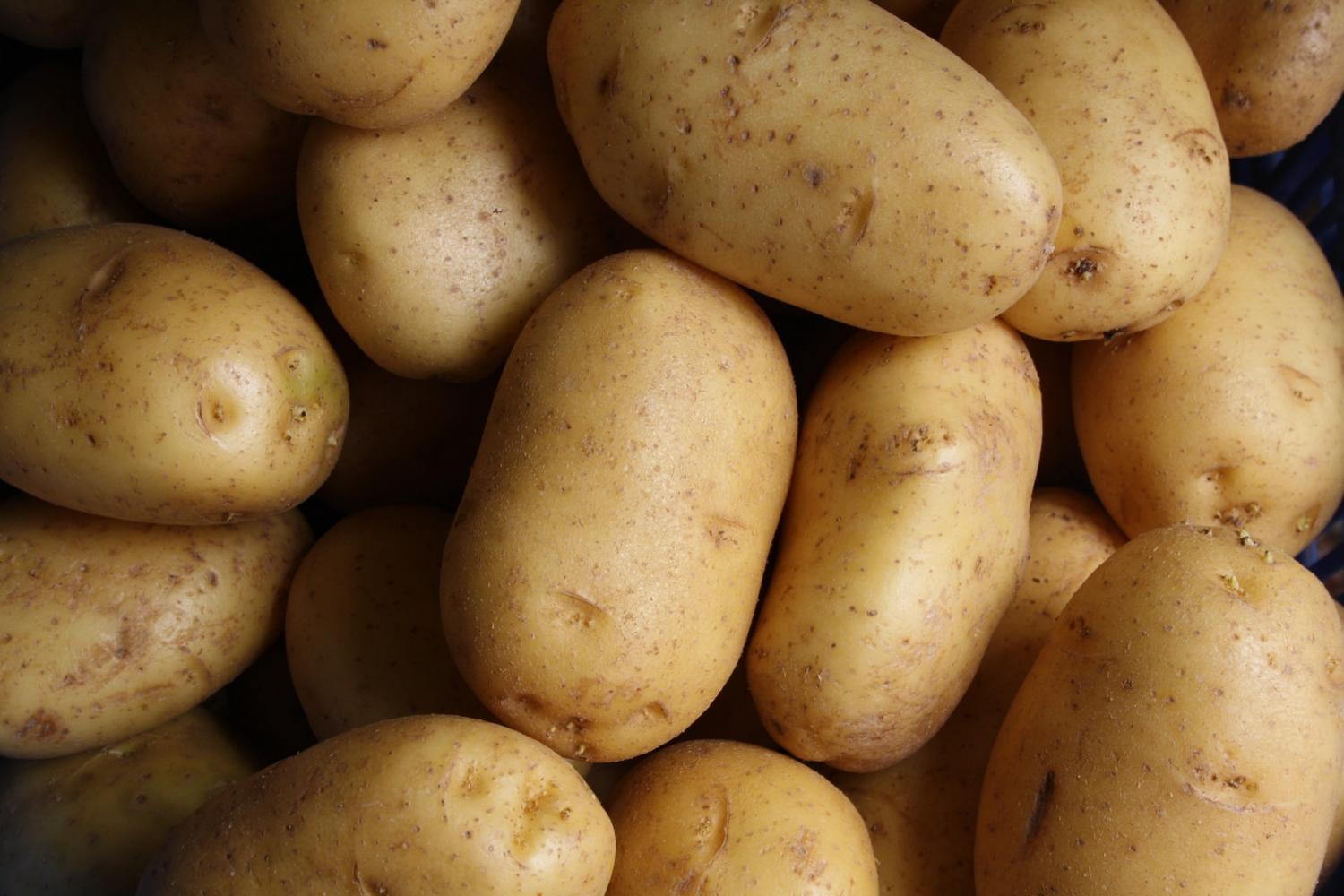
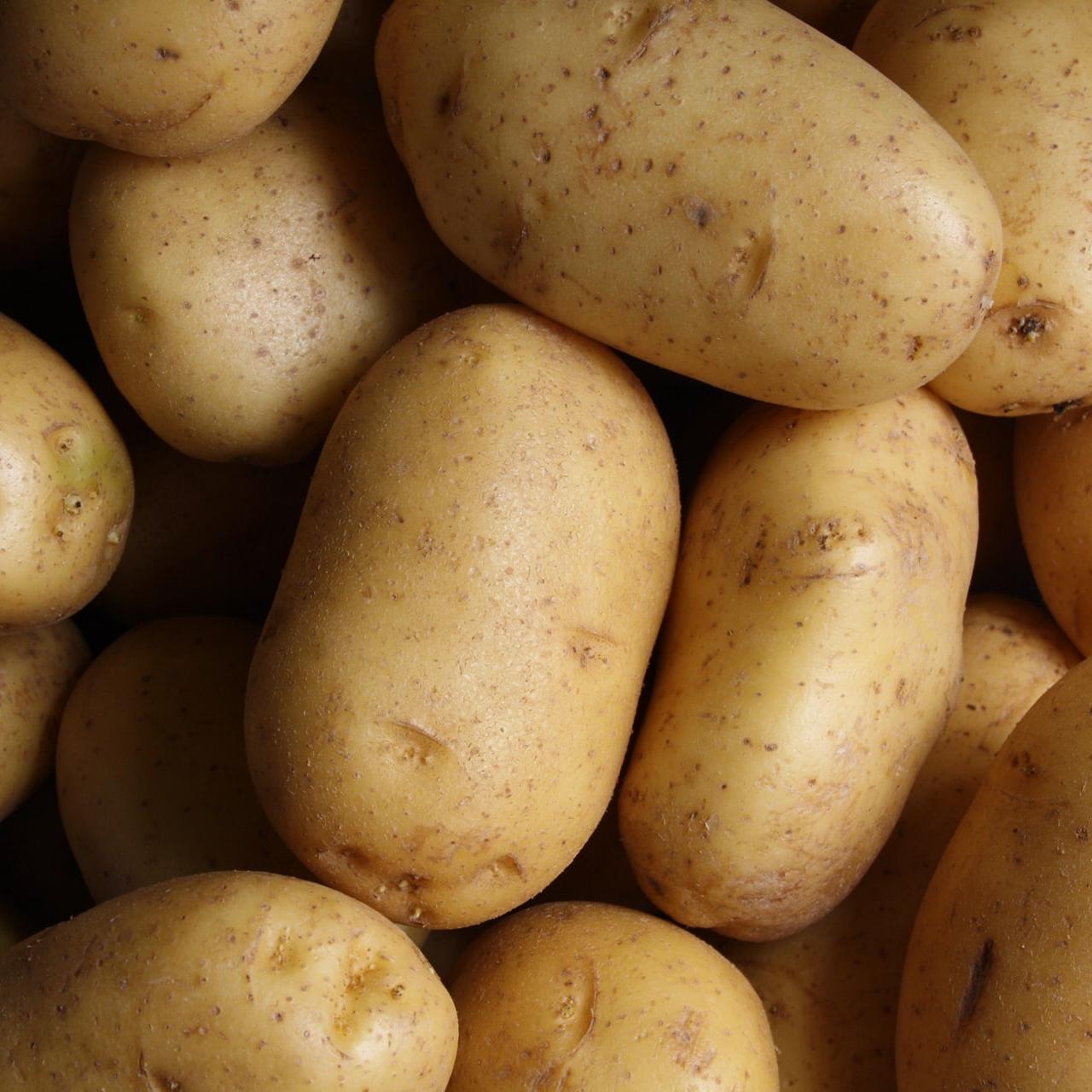
While fast-food chains have generally been dishing up new meat-free versions of burgers and tacos, Taco Bell has so far been an iconoclast during the ongoing plant-based fast food wars. To date, the popular fast-food chain has relied on traditional vegetarian standbys such as beans and potatoes. Last year the brand decided to make it easier for non-meat eaters to order at its locations by rolling out a vegetarian menu.
But like other restaurant chains, Taco Bell has had to pivot quickly during this pandemic, which thereby comes with supply chain disruptions, dining room closures, and the need to take on new health and safety precautions.
So, the Irvine-based chain announced late last week that it was nixing several items from its menu, including those laden with potatoes.
It’s a curious move considering that potatoes are on a roll as many consumers are seeking comfort food during this era of self-quarantining and shelter-in-place orders. Major potato producers including McCain Foods and J.R. Simplot are also touting the sustainability of their cornerstone food products.
For Taco Bell, this is a bottom-line business decision. Without saying so explicitly, the company has to adapt to a new reality of drive-in purchases and delivery services via third parties. (Plus, have you seen the lines at the local fast food drive-in lately?) Add the reality of ordering at a drive-in lane, satirized perfectly by this Saturday Night Live skit from almost 30 years ago, and you’ll get it.
Judging by the backlash on social media, however, one would think Taco Bell would need to hire the same crisis communications firms needed when celebrities like Kendall Jenner and Lea Michele had their own episodes of public scorching on platforms like YouTube and Twitter. The comments ranged from the all-caps rants we are usually accustomed to getting in emails from the unhinged uncle to surmising that “getting rid of potatoes and loaded grillers is actually illegal.”
Food and culture writer Bettina Makalintal was far more measured on Vice: “Swapping potatoes in for meat seemed genius, like a secret you only knew if a stoner friend passed it along to you, and a potato-filled Quesarito is a delight of carb overload that I can only hope you experience before the sad day of August 13, 2020.”
The stark reality of today’s economy, however, means adding affordable menu items while making an eight-hour shift less complicated for employees. As for the ditching of potatoes, one writer noted that just about all of Taco Bell’s food items can be customized to be vegan.
Of course, there is another option that vegans in the know seek out when they crave Mexican food, and are easily found in California and the Southwest: nopal cactus, or nopales — they offer a nice crunch and texture without the carb calorie bomb. Now that would be a menu addition that would score Taco Bell endless press and social media buzz.
As for Taco Bell skipping the plant-based protein craze, brace yourself: The company’s CEO, Mark King, told Bloomberg earlier this year that the chain had been in talks with both Impossible Foods and Beyond Meat.
Image credit: Lars Blankers/Unsplash
Trader Joe’s Will Say Ciao to Giotto, José and Ming
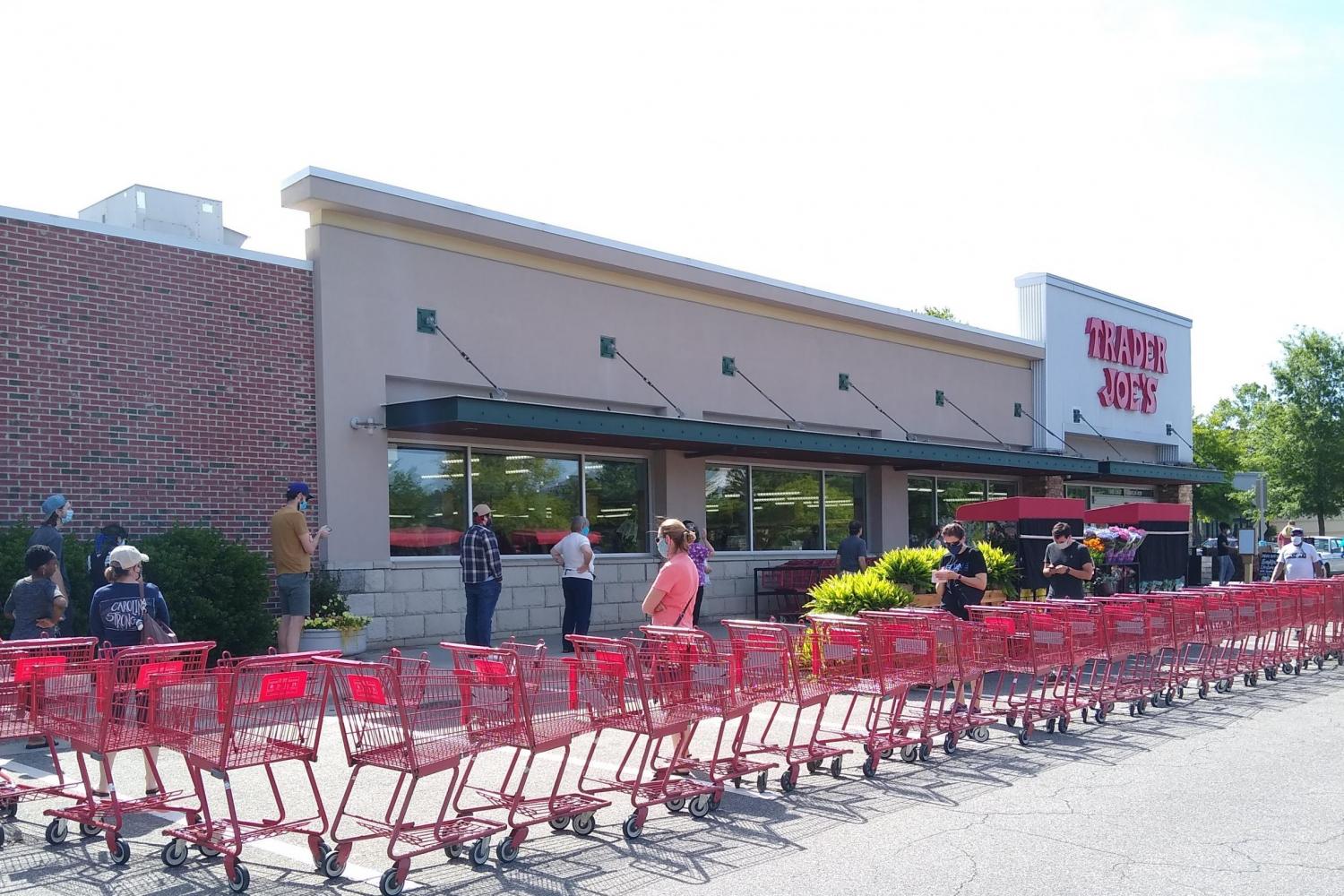
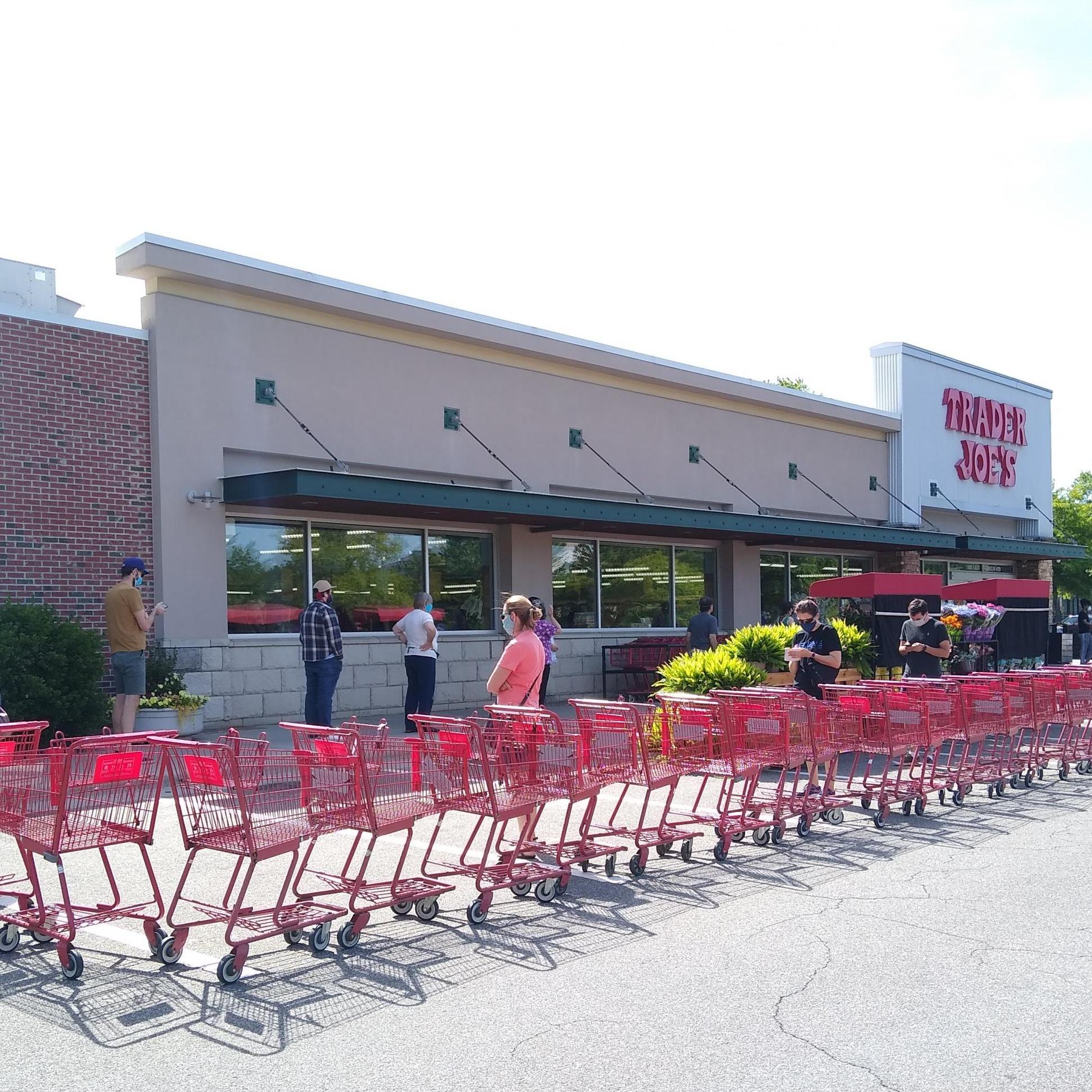
Update: Since this story broke, Trader Joe's has announced that it will soon remove such labels from it's packaging.
Trader Joe’s has long built its business catering to a certain demographic: the “woke” over-educated consumer who’s really curious about food from around the world but doesn’t necessarily have the coin, or time, to cook such creations from scratch. It’s a palace of gastronomy for those with Dom Perignon taste on a Two Buck Chuck budget.
The Trader Joe's schtick has worn thin
But to some, the Polynesian schtick and irreverent packaging that has made Trader Joe’s a fan favorite since the chain started in California during the late 1960s has worn thin. In the wake of the protests over the murder of Black Americans by police officers, which sparked the sunsetting of brands including Aunt Jemima, Mrs. Butterworth’s, and even the last Sambo’s breakfast restaurant, some believe it’s time that Trader Joe’s rethinks its labeling.
The problem is some of the catchy packaging found on various foods throughout Trader Joe’s. Trader Giotto’s made 99-cent bags of pasta a pantry staple; Arabian Joe’s helped put flatbread on the U.S. map; Trader José offers a rainbow color palette of salsas and Mexican food; Trader Joe San and Trader Ming’s gave wallets a break by curbing the urge to order Chinese or Japanese take-out.
Enough of the Jungle Book vibe, already
But what may seem cute and flippant to some consumers is offensive to others. Critics say this is yet another example of white people fetishizing cultures deemed different than their own. To that end, a group recently launched an online petition demanding that the grocer remove what it says is “racist branding and packaging” from its stores.
The petition also noted that the store’s branding itself is based on its founder, Joe Coulombe, who took inspiration from a book (White Shadows in the South Seas) and an amusement park ride (Disneyland’s Jungle Cruise Ride), both of which have their own problematic views toward how they portray Indigenous cultures.
For those who are weary of what they say is at a minimum a tone-deafness of Trader Joe’s branding, the retailer's cultural appropriation is nothing new. After all, many of us may remember our parents or grandparents referring to Asians as “Orientals” – and that word in turn was often our great-grandparents’ and their ancestors’ term to refer to people living in the Middle East. Over 40 years ago, Columbia University professor and author Edward W. Said laid this all out in his book Orientalism, which in a nutshell describes how centuries of colonization in the Middle and Near East have given much of the world a warped vision of those regions.
Branding that makes some feel like an "other"
Whether or not one views this packaging as racist, the reality is that some of Trader Joe's branding definitely does make some people feel like an "other" — and some, frankly, just aren't having it anymore.
The online petition, which as of press time is close to reaching its modest goal of 1,000 signatures, is not the first time Trader Joe’s has been called out on its branding. After one blogger contacted the grocer’s public relations department asking about the “Trader Ming” packaging, the company’s PR director replied, “Some time ago, we made the decision to use only the Trader Joe's name on our products moving forward.”
Trader Joe’s sent a similar reply to SFGate after its food and drink editor ran a story on the online petition.
At a higher level, the renewed talk of Trader Joe’s labeling shows that, as is the case with other grocery chains, it has a challenge appealing to people of color. The company gives off the vibe that it’s a haven for white hipsters (who may not have the budget for Whole Foods or Harris Teeter), even though the company has it share of Black fans. And at a time when food deserts are on the radar again during this national reckoning on racial equity, Trader Joe’s has long had a reputation of avoiding communities of color – until the evidence suggests gentrification led by white people is well underway.
Image credit: Mx. Granger/Wiki Commons
COVID-19 is Fueling a Surge in Global Hunger
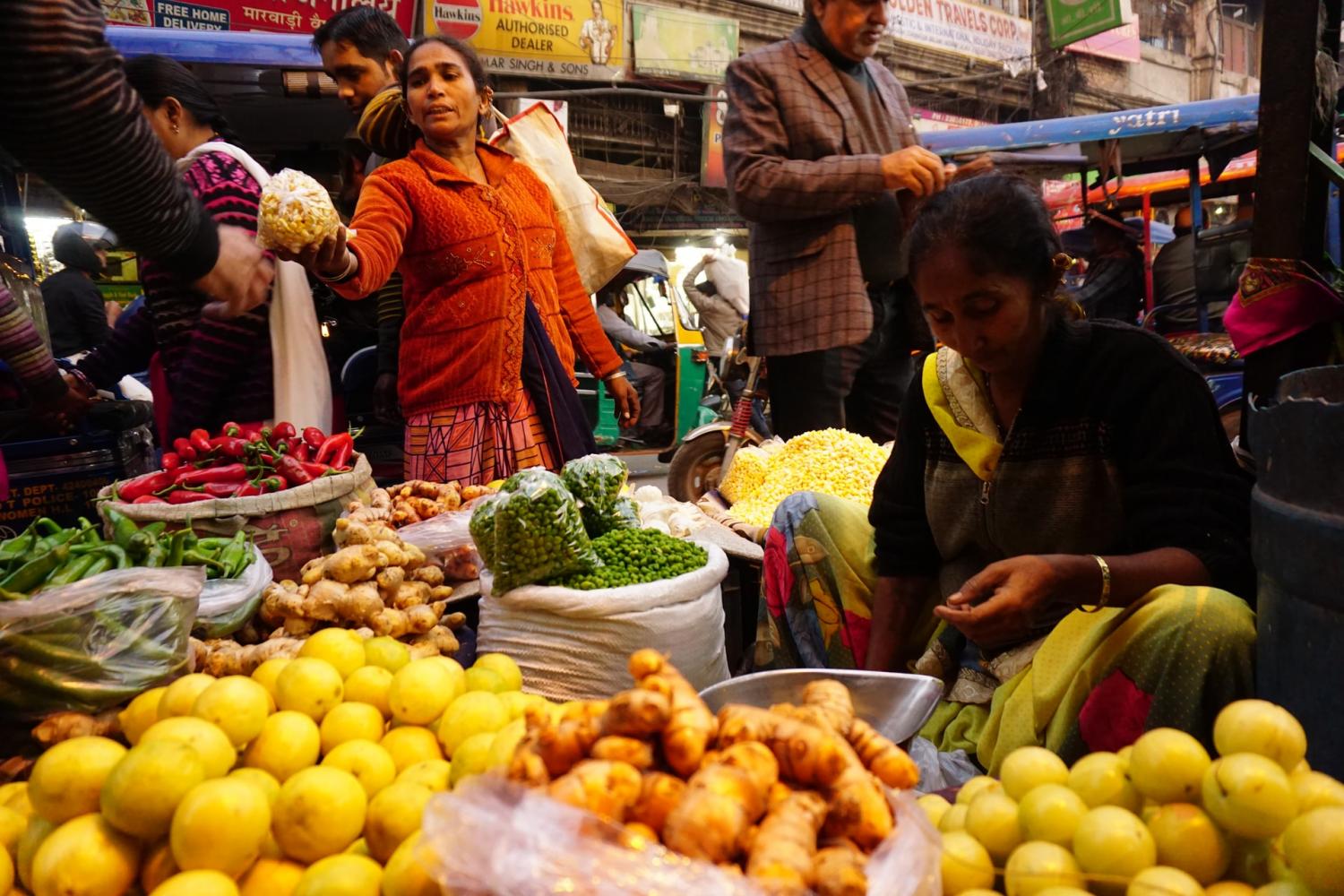
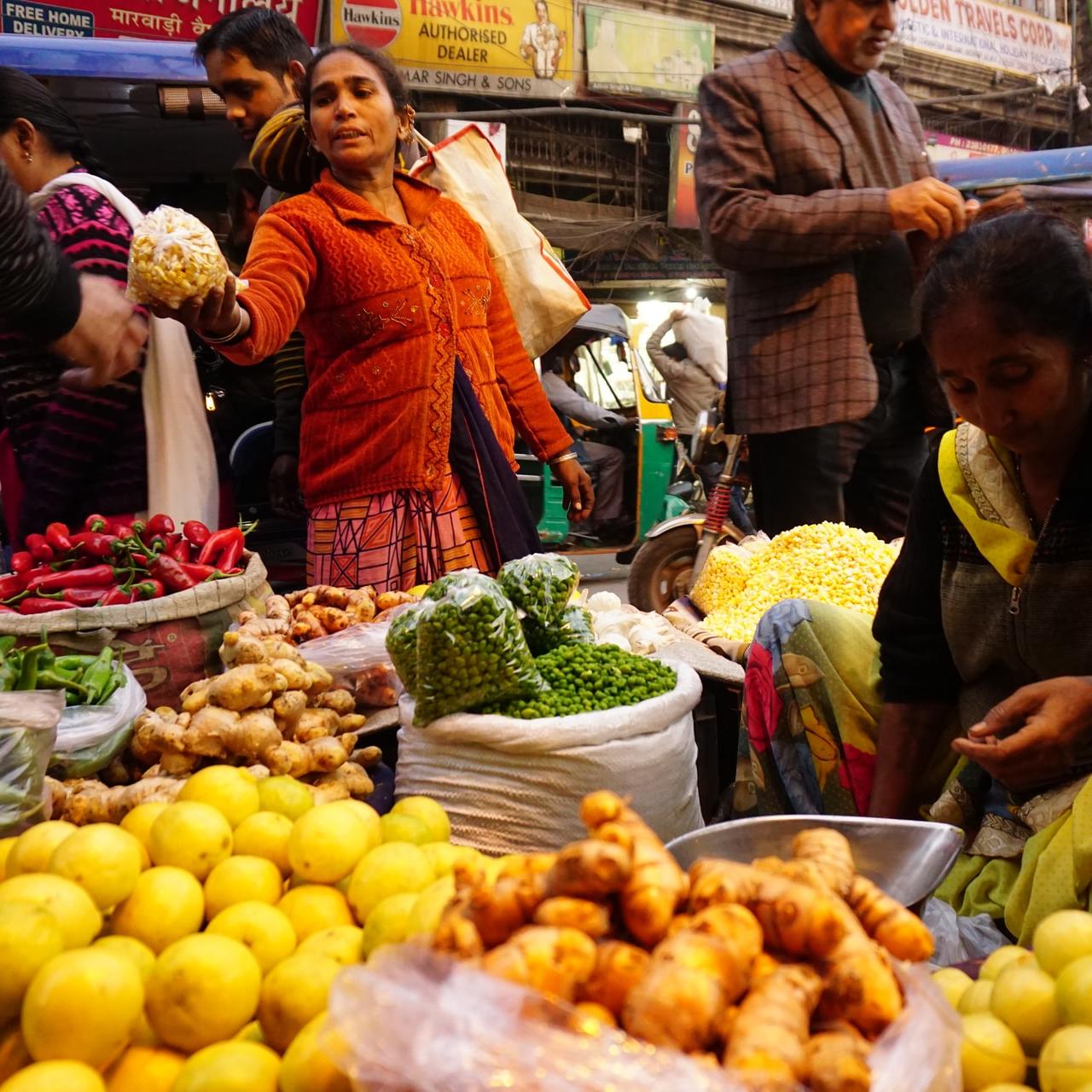
Food companies may say “Black Lives Matter” and insist they are determined to “protect” essential workers, but there’s an inconvenient reality hidden behind these public proclamations. Many of these food companies are profiting handsomely while global hunger continues to rise, says a leading humanitarian aid organization.
Food companies profit while global hunger trends upward
The NGO Oxfam recently lashed out at global food companies in a recent report. Calling the novel coronavirus a “hunger virus,” the writers of this report describe as unconscionable that 12,000 people a day could die from hunger exacerbated by COVID-19 while eight of the world’s largest food companies have paid a collective $18 billion to their shareholders since the beginning of this year.
From Oxfam’s point of view, the COVID-19 pandemic has unleashed a bevy of social problems all contributing to global hunger, including mass unemployment, declining humanitarian aid, a broken food supply chain, climate change and income inequality.
And despite the fact that certain regions of the world, including North America, the European Union and Australia, can boast food surpluses (despite panic buying), Oxfam paints a nefarious picture of food companies “using” the COVID-19 pandemic to hike prices on consumers.
Global ‘hotspots’ and wealthier nations all face risk
The problem is everywhere. Indeed, some of the most vulnerable nations, including Yemen, Afghanistan, Venezuela and Haiti, are “extreme hunger hotspots,” according to Oxfam’s statistics. But wealthier countries are not immune from food insecurity. That includes the U.S., where Oxfam cited data suggesting consumer prices have risen 2.6 percent, even while farm income has decreased.
“Now the coronavirus has combined with the impacts of conflict, spiraling inequality and an escalating climate crisis to shake an already broken global food system to its foundations, leaving millions more on the brink of starvation,” say the authors of this Oxfam report.
While Oxfam certainly wags its finger at the private sector for its contributions to the emerging global hunger crisis, the NGO for the most part leaves it up to governments to launch drastic action in order to solve these problems. The organization’s six-point plan includes a call for wealthier governments to support humanitarian aid worldwide to prevent people from succumbing to starvation. In addition, Oxfam calls for both the private and public sectors to work together and ensure employees across the entire agribusiness value chain can safely show up for work, whether they are farmworkers or street vendors.
And in a nod to the fact that women play a huge role within the global food industry, yet generally face the most risk (and often have little influence in the worldwide COVID-19 response), Oxfam is calling for bolder action to address the discrimination they face when it comes to scoring credit, technology and access to land.
With 13.7 million and counting COVID-19 cases, will it get worse?
As data suggest the number of total COVID-19 cases will soon reach 14 million, Oxfam envisions an even harsher surge in global hunger if more drastic measures are not taken.
The real canaries in the coal mine now are Brazil, India and South Africa. Oxfam describes each of these middle-income countries as “emerging hotspots,” where social distancing measures – if they are followed at all – tend to push the poorest citizens to hunger rapidly as they have little or no safety net. The three nations are also important parts of the global food supply chain yet travel restrictions and lockdowns have left many communities at risk. Small-scale farmers in India, for example, have been unable to hire migrant workers at the peak of harvest season.
Oxfam has funded programs to fight hunger in the three nations, but it’s clear the NGO is armed with little more than a slingshot to confront the rising assault of global hunger. Organizations like Oxfam can only do so much: If the world’s largest food companies truly want to meet the moment and become the global citizens that they claim to be, it is past time to ramp up their anti-hunger efforts. The tactics could include distributing food to those who need it most, lobbying their governments to cancel poorer nations’ debts or funding sustainable agriculture programs.
This is about more than checking a box or blunting global hunger – it’s simply a pragmatic move to secure food companies' supply chains, and global consumer base, for the long haul.
Image credit: Stephanie Liao/Unsplash
Elevating Racial Equality Requires a Holistic ESG Approach
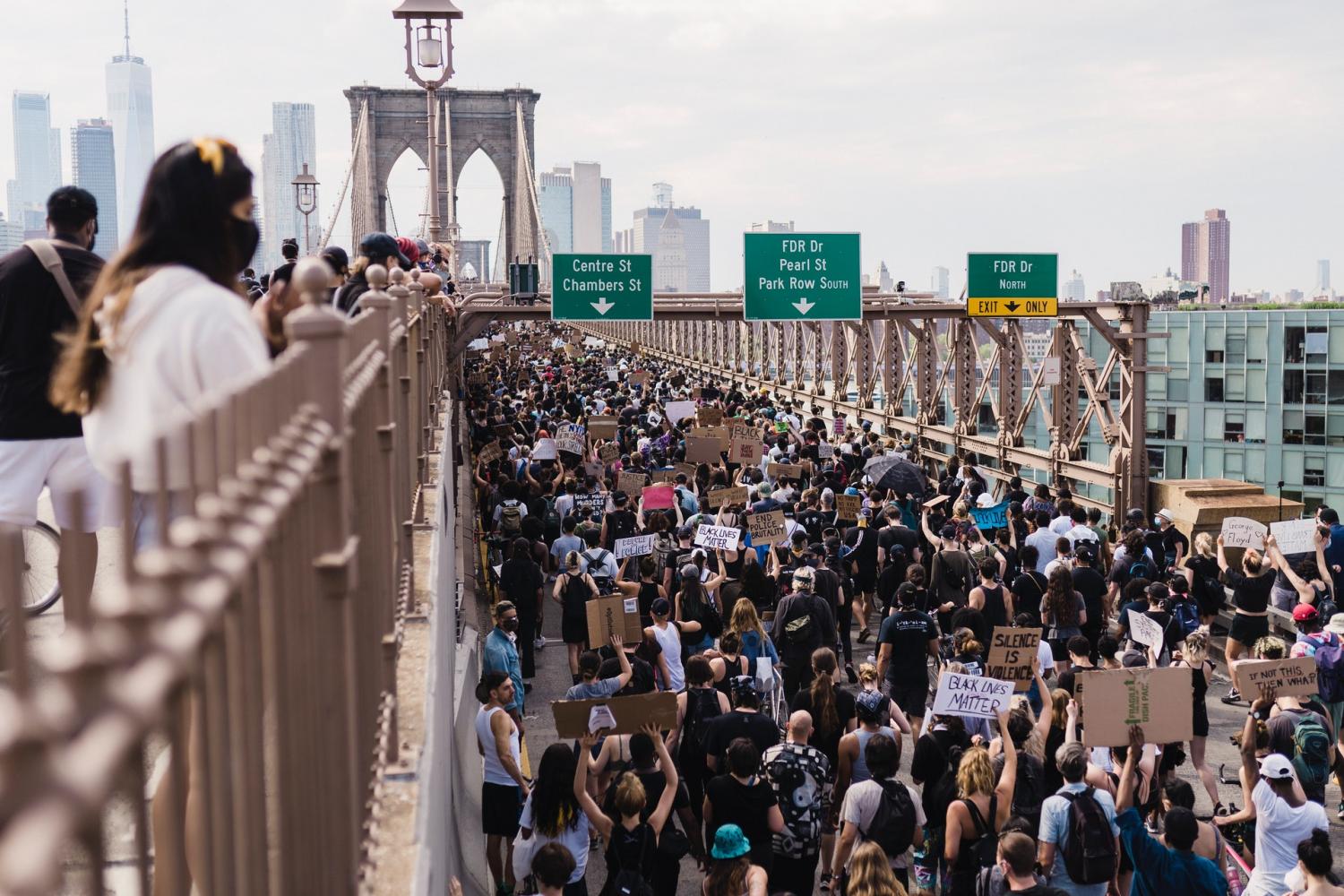
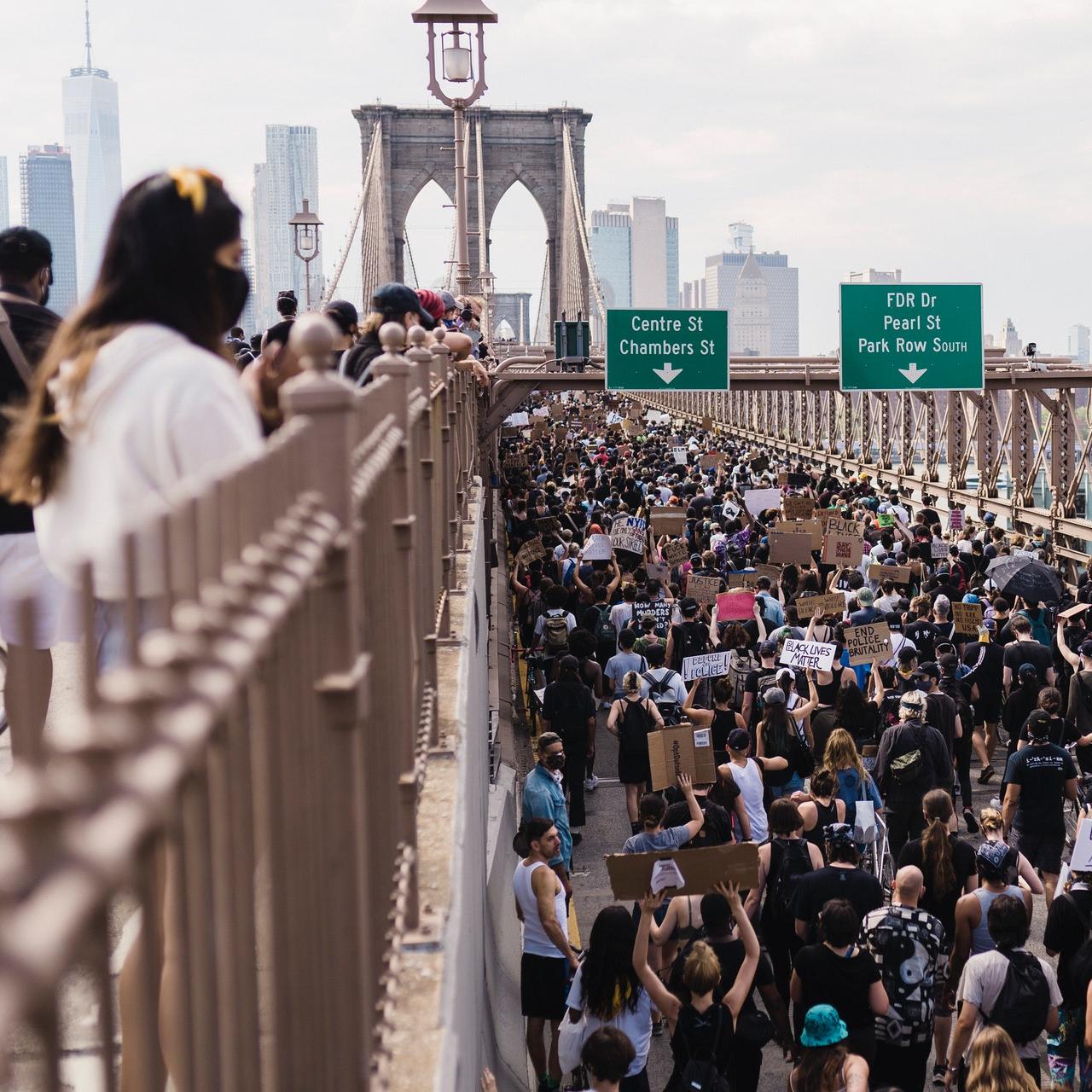
This article on what companies can do to improve on their racial equality performance was written with Jane P. Madden, Managing Partner, Global Sustainability & Social Impact Practice Leader, Finn Partners.
In response to the murder of George Floyd by police in late May, America has brought BIPOC (Black, Indigenous and people of color) issues front and center, with corporations speaking out in support of racial equality like never before. In addition, racial equality and economic disparity has become an increasingly important part of the COVID-19 discussion. As we head into August, companies must go beyond standalone Black Lives Matter statements and social media blackouts. To do this, they must begin implementing authentic and sustainable changes into their business strategy.
As the anti-racist movement, a global pandemic and ongoing environmental crises converge, it has become increasingly clear that environmental and governance issues are also social issues. As governments, NGOs and activists navigate solutions, it is also critical that businesses reassess how to create financial value while also utilizing their business to generate social value.
Racial equality is a vital part of ESG
ESG (environmental, social, governance) performance is the core of responsible business. It is also a powerful business driver that builds resiliency. In fact, research from BlackRock suggests a majority of ESG-focused investment portfolios have outperformed non-sustainable counterparts during this year’s coronavirus-driven downturn – and the investment giant is even going so far to vote against management in companies in which it has invested.
My colleague, Jane Madden (Managing Partner, Global Sustainability & Social Impact Practice Leader at Finn Partners), shares it has always been a best practice that ESG be approached in an interdisciplinary manner and reflect the mission and core values of the company. But as we see the silos of ESG break down even further, companies need to look at ESG through an integrated and holistic lens.
For example, recent anti-racism protests have put environmental justice in the spotlight, as activists reconnect the social justice movement with the disproportionate number of people of color and the poor who live and work in places with degraded environmental quality (both an “E” and an “S” issue). “The lack of corporate board diversity and management (generally a “G” issue) limits benefits realized from diverse points of view, but it has also played a large role in socio-economic disparities across the country,” Jane says. “Furthermore, sustainability leaders need to own past discrimination and integrate anti-racism into the discipline. They can no longer look at the E, S or G as stand-alone issues.”
Public health, systemic racism and fostering more diverse and inclusive workplaces are very complicated. These challenges and their solutions must not be over simplified. There are several principle-based actions companies can take to ensure better incorporation of ESG to create a more equitable, resilient, and social-positive business.
Five actions businesses can take to secure racial equality
Go Beyond the Pledge. Commitments to racial equality need to be supported by measurable actions. Companies who have made statements of solidarity with Black Lives Matter and other organizations, but who do not have diverse hiring or labor practices, have been rightly criticized. Companies that strive to improve performance need to own past behavior and be open about their challenges. Most importantly, they need to take thoughtful actions that will have lasting impact by creating a more diverse, inclusive and equitable workplace.
Be transparent. The foundation to any ESG strategy is transparency. As the world and the markets rapidly shift, companies need to be transparent in their commitments and honest and modest about their actions and achievements, particularly when it comes to BIPOC employees and communities, to earn trust.
Activate diversity competency. According to Black Enterprise, 187 S&P 500 companies (37 percent) did not have a single black board member in 2019. Critical diversity and inclusion initiatives should expand to include DE&I competency, especially at the board and management level. Just as climate leaders called for “climate competency” on corporate boards several years ago, we need to build “diversity competency” on corporate boards. Implementing new policies and actions, including: the hiring and wage equity practices; ensuring that the talent pipeline includes historically black colleges and universities (HBCUs), black and minority student groups and alumni associations; and linking management performance to diversity, equity and inclusion outcomes, will strengthen the business. They will also add long-term value from new talent and a more inclusive corporate culture. More diverse and culturally inclusive workplaces can also help systematically address the wealth gap for BICOP employees.
Think and act local. Engaging with local community groups is a critical piece of developing and implementing any business strategy. While national or multinational organizations provide expertise and scale for certain issues, going local should, at the very least, be carefully considered as part of any strategic engagement. This may mean partnering with local organizations to advise on hiring practices or identifying business partners who can help achieve business and communication goals through a thoughtful social impact lens.
Donations are necessary but not sufficient. There will always be a critical role for corporate donations, but it does not replace rethinking and changing your business model from hiring to marketing to products and services. One-time donations, while welcome, may not always make the intended impact. Reactionary contributions made in the name of racial equality can come off as disingenuous, especially if the cause does not align with the company’s core values or is contrary to its actions. Utilizing the company’s core business competencies, employee skills and resources, and implementing long-term impact investments, can create more equitable and resilient economies and communities, and better meet employees’ values and their own growth objectives. These same actions strengthen trust and loyalty and can develop talent and customer pipelines. Use the power of your corporate purse in another way – support and integrate black-owned businesses into your supply chain.
Corporate sustainability is not a zero-sum game. The rise of social issues, including racial equality, does not diminish the importance of environmental issues. All must be addressed. To be effective and meet ESG performance goals, environment, social and governance issues must be considered holistically and be integrated into business strategy.
Image credit: Life Matters/Pexels